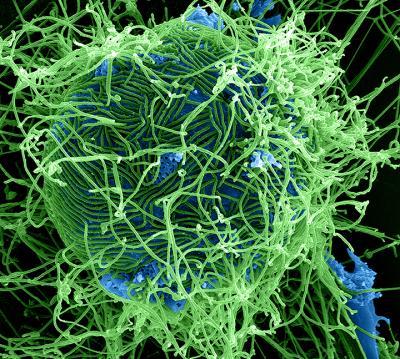The latest outbreak of Ebola virus disease that has claimed more than 1,000 lives in West Africa and poses a serious, ongoing threat to that region: the spread to capital cities and Nigeria —Africa's most populous nation — presents challenges for health care professionals.
The situation has garnered significant attention and fear around the world, but proven public health measures and sharpened clinical vigilance will contain the epidemic and thwart a global spread, according to a new commentary by Anthony S. Fauci, M.D., director of the National Institute of Allergy and Infectious Diseases (NIAID), part of the National Institutes of Health.
In the article, Dr. Fauci provides background on the Ebola virus, describes the transmission factors and clinical symptoms associated with infection, and highlights the healthcare and socio- economic issues that have fueled the Ebola epidemic in Guinea, Liberia, and Sierra Leone.

Colorized scanning electron micrograph of filamentous Ebola virus particles (green) attached to and budding from a chronically infected VERO E6 cell (blue) (25,000x magnification). Credit: NIAID
Although global air travel may carry an unknowingly Ebola-infected person to the United States or other affluent country at some point, the risk of the traveler triggering an outbreak is extremely small because those countries—in contrast to West Africa—have the public health resources and infrastructure to: isolate suspected cases, provide advanced supportive medical care for the infected, trace and monitor the contacts of infected individuals, and properly handle biohazardous materials, Dr. Fauci writes.
The article briefly describes the investigational Ebola treatments and vaccines currently under accelerated development but cautions against "premature deployment of unproven interventions" that could further strain the relationship between healthcare professionals and patients in West Africa.
"Sound public health practices, engagement with affected communities, and considerable international assistance and global solidarity will be needed to defeat Ebola in West Africa," Dr. Fauci concludes.